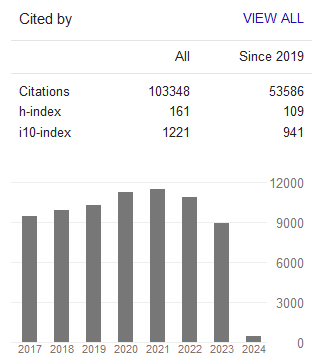University Students' Perception of Their Own Academic Achievement Motivation: A Field Study
- Fares Hilmi
Abstract
The aim of the present two-stage study was two-fold: first, to identify motivational themes thought of by
university students themselves as to what causes their very high motivational learning states, and also their very
low motivational states; and second, to determine the underlying dimensions affecting both of these states.
Undergraduate students studying at a major government university in Jordan were used in this study. All of the
subjects were from different colleges and were enrolled in an elective university course. 534 subjects were used
in stage one of the study, and 304 other students were used in stage two.
A modified version of the Critical Incidents Technique was employed to elicit various themes considered by
university students as causes of states of very high and very low motivation to study. It was assumed that all that
university students think of as learning-encouraging or learning-discouraging represents very high and very low
learning motivational themes. Content analysis quantification was carried out in order to determine a university
students' motivational themes list.
Using the Principal Component Analysis statistical technique to cluster-analyze the 14 very high motivational
state themes resulted in four motivational dimensions. These dimensions are as follows: 1) self-determination, 2)
positive academic attitudes, 3) need for social respect, 4) self-monitoring.
Cluster analysis of the 10 very low motivational state themes produced three dimensions, which are as follows: 1)
negative personal feelings and circumstances, 2) learned helplessness, 3) negative self-monitoring.
- Full Text:
 PDF
PDF
- DOI:10.5539/ijbm.v8n10p67
Journal Metrics
Google-based Impact Factor (2023): 0.86
h-index(2023): 152
i10-index(2023): 1168

Index
- Academic Journals Database
- AIDEA list (Italian Academy of Business Administration)
- ANVUR (Italian National Agency for the Evaluation of Universities and Research Institutes)
- Berkeley Library
- CNKI Scholar
- COPAC
- EBSCOhost
- Electronic Journals Library
- Elektronische Zeitschriftenbibliothek (EZB)
- EuroPub Database
- Excellence in Research for Australia (ERA)
- Genamics JournalSeek
- GETIT@YALE (Yale University Library)
- IBZ Online
- JournalTOCs
- Library and Archives Canada
- LOCKSS
- MIAR
- National Library of Australia
- Norwegian Centre for Research Data (NSD)
- PKP Open Archives Harvester
- Publons
- Qualis/CAPES
- RePEc
- ROAD
- Scilit
- SHERPA/RoMEO
- Standard Periodical Directory
- Universe Digital Library
- UoS Library
- WorldCat
- ZBW-German National Library of Economics
Contact
- Stephen LeeEditorial Assistant
- ijbm@ccsenet.org
